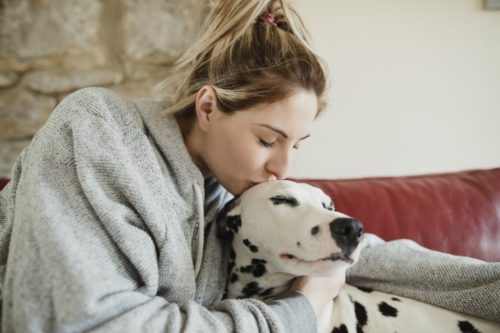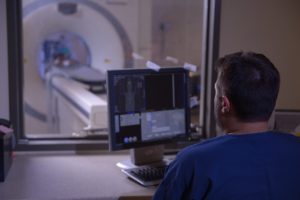My Pet Has a Cancer Diagnosis—Now What?

Being told that your pet has cancer is scary, and you will probably have a lot of questions about what comes next. Our oncology department will work with your family veterinarian to help you through your pet’s cancer journey, from diagnosis to treatment.
Staging Your Pet’s Cancer
We will first gather as much information as possible about your pet’s cancer and their general health by performing diagnostic tests that may include:
- Complete blood count (CBC) — A CBC measures the number of your pet’s different blood-cell types to screen for abnormalities, such as anemia, infection, and immunosuppression. There are very few cancers that can be detected on routine blood work, which is a common misconception.
- Blood chemistry — Measuring different proteins in your pet’s blood provides information about organ function and overall health status.
- Urinalysis — Testing your pet’s urine informs us about the function of their kidneys and other organs.

- Imaging — Imaging modalities, such as X-rays, ultrasound, computed tomography (CT), and magnetic resonance imaging (MRI), are often used to localize cancerous masses, measure their size, and determine whether a primary cancer has spread to other body parts.
- Biopsy — A sample of your pet’s cancerous tissue may be collected with a needle, or during a surgical procedure, to determine the cancer type.
The information will allow us to identify the type of cancer, how much it has advanced, and whether it has metastasized (i.e., spread) to other body parts.
Treating Your Pet’s Cancer
Once we have established a thorough diagnosis, we can design a personalized treatment plan for your pet’s cancer, which will likely consist of a combination of treatments, such as:
- Surgery — Surgical removal of a cancerous mass often offers the best chance for a complete cure, and surgery is often combined with chemotherapy and/or radiation to attack cancer from multiple angles. If complete excision is not possible, surgery may be performed to partially remove a tumor to make pets more comfortable, or increase effectiveness of other treatments.
- Chemotherapy — Chemotherapy, which is the use of medication to kill cancer cells, is often used after surgery to kill microscopic cells that have spread from a primary mass, or to manage a cancer that cannot be surgically removed. Human chemotherapy medications are known to cause significant side effects to cancer patients; however, pets receive much lower chemotherapy doses and typically experience few, if any, side effects.
- Radiation — Radiation uses a focused beam of energy to target and kill cancer cells, while sparing nearby tissue. We recently added a state-of-the-art Varian Halcyon linear accelerator, which is the most advanced unit available for both human and veterinary radiation. The Halcyon unit allows us to treat once-untreatable cancers by delivering high doses of radiation directly to cancer cells, and to reduce treatment times. Radiation can be used to cure a cancer isolated to a single mass, or as part of palliative care to shrink inoperable tumors, reduce pain, and improve a pet’s quality of life.

Your Pet’s Cancer Prognosis
Your pet’s prognosis will be based on her cancer type, stage, and location, and whether metastasis has occurred. Our oncology team can share statistics of pets who have had similar cancers; however, each pet responds to cancer treatments differently. Preserving your pet’s quality of life is always our primary concern, and our oncologists will present all information and treatment options so you can make the best decisions for them. With the advancements in veterinary medicine, we can cure many cancer types, but some are incurable, and our treatments will focus on keeping your pet comfortable and pain-free, and prolonging their time with you.
If you have questions about your pet’s cancer diagnosis, or would like to schedule an appointment with our oncology department, contact us.






 Email
Email





